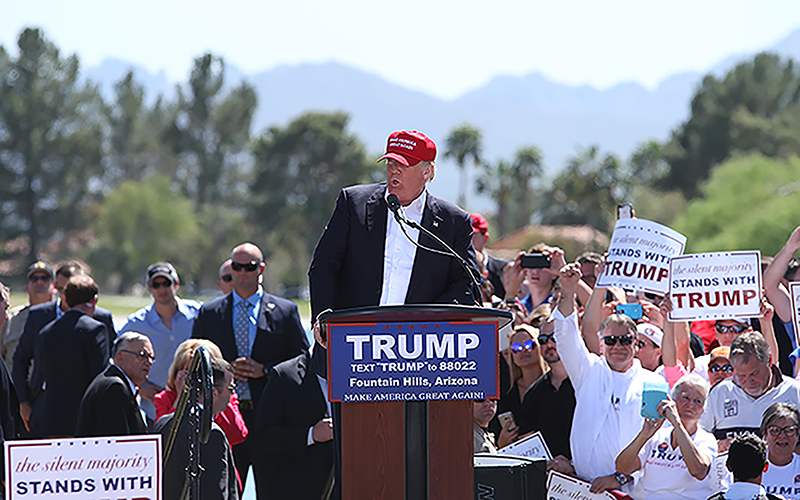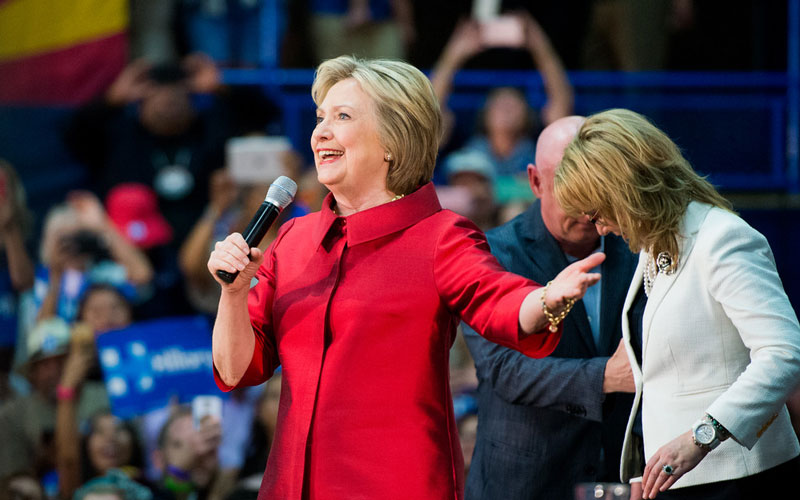
GOP presidential nominee Donald Trump at a March rally in Fountain Hills. Despite his popularity in the state, Trump’s fundraising was relatively anemic until recently. (Photo by Miguel Otárola/Cronkite News)

Hillary Clinton at a March campaign stop in March at Phoenix’s Carl Hayden High School. The Democratic presidential nominee has raised $1.7 million in Arizona, far more than Trump. (Photo by Ben Moffat/Cronkite News)
WASHINGTON – Republican presidential nominee Donald Trump raised three times as much money from Arizona contributors in June as his total fundraising in the state in the preceding year, according to the latest reports from the Federal Election Commission.
Trump brought in more than $340,000 from the state in June, after it became clear that he would be the party’s nominee, bringing his total from the state to nearly $460,000.
But experts say that still leaves the Trump campaign well behind where it should be for fundraising from Republican-leaning Arizona, a fact that one consultant said is proof that support among the state’s donor class is still “quite weak.”
“I wouldn’t describe it as a huge jump in donations, it may look that way…he still has a long ways to go to catch up to the pace,” of previous GOP nominees, said Republican political consultant Jason Rose. “It’s certainly improvement, but it also shows continued reluctance of some of Arizona’s donors to go in.”
The FEC report released last week shows that Trump raised more during June in Arizona than Democratic presidential nominee Hillary Clinton, who raised about $297,000 in the state for the month. But Clinton had a huge head start, and has pulled in $1.7 million overall from the state, while Trump still has “a long way to go” to get the $1.5 million that Rose said is the lower end of what he should be raising in the state.
But political consultant Mike Noble noted that Trump ran a fairly unconventional campaign for nearly a year, largely self-financing his bid for the White House and not soliciting donations like a traditional candidate would.
That changed this summer when it became clear that Trump would be the GOP nominee, and the campaign revved up its fundraising efforts and made staffing changes, including firing campaign manager Corey Lewandowski, according to Noble. The Trump campaign also announced this week that it had named Arizona State Treasurer Jeff DeWit the campaign’s chief operation officer.
“I think what you’re seeing is they’ve gotten much more organized,” Noble said. “At the end of the day, modern-day presidential campaigns get pricier and pricier every time.”
Kirby Goidel, a professor of political communication at Texas A&M University, attributed the change in fundraising to the fact that Trump has “recognized that he doesn’t want to spend his own money, so he’s been actually actively soliciting donations for the first time.”
“So you can see across the board his fundraising not just in Arizona but everywhere is going up dramatically,” Goidel said. “I think he sent out his first fundraising appeal June 20th, somewhere in there. So he’s late to the game, but he did finally come to the game.”
Rose said that while donations did pour in in June, Trump’s hope likely remains support from smaller donors. Polls showing Trump leading over Clinton could help as well, he said.
“People are going to start seeing that, they’re going to see a winner and they’re more likely to bet on that horse,” Rose said.
Rose pointed out that Trump’s fundraising isn’t near that of Sen. Marco Rubio, R-Florida, a 2016 presidential hopeful who dropped out, but had raised more than $798,000, according to his June FEC filing. It is also dwarfed by the $4.2 million that 2012 Republican nominee Mitt Romney had raised in Arizona by this time four years ago,
“At the end of the campaign, he should be pulling $1.5 (million) to $4 million out of Arizona,” Rose said. “So he’s got a long ways to go.”